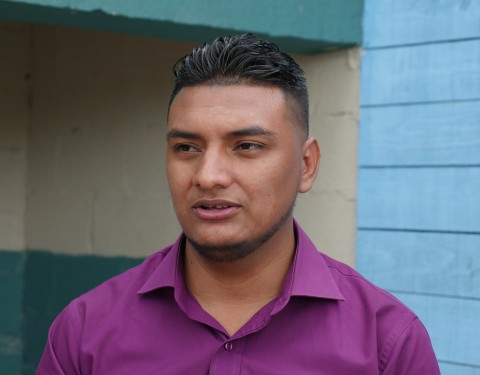Héctor Rodríguez, Honduran pastor, reaches out to gang members
In a neighborhood controlled by gangs, Rodríguez ministers to their families—and sometimes the men themselves.

Héctor Mauricio Rodríguez Lainez, pastor at Aposento Alto United Methodist Church in Tegucigalpa, Honduras, often goes walking around his neighborhood. If he sees young girls and boys, he stops and prays with them.
Prayers are especially needed in Fuerzas Unidas, an 11-block neighborhood controlled by gangs, called maras, who target children for sex and to sell drugs.
“If someone refuses to join the maras, they are given 48 hours to get out of the country or they will be killed,” Rodríguez said. “But really, they usually don’t get 48 hours.”
Honduras is one of the most violent places in the world. Tens of thousands of people, many of them unaccompanied minors, flee across borders to escape death, rape, and extortion at the hands of the maras.
Rodríguez, 23, serves a congregation of 230 that is mostly children and young people.
“The church is trying to attract gang members’ families,” he said. “Most of the kids who go to our church are children of gang members.”
Rodríguez said the gangs are always watching who comes in and out of the neighborhood. He believes the gang members can relate to him because he is young.
One of the gang members called out to him one day, calling him pastor.
“I was shocked he knew I was a pastor,” he said. “He knew my schedule. He asked me if I had been robbed and said he could offer me protection. I asked him if he wanted me to pray for him. He looked around and then said, ‘You have five seconds to pray for me.’ So I just said, ‘God be with you and amen.’”
On another day while Rodríguez was praying with a group of people on the street, a young single mother started crying. She said she had been raped by ten or more gang members—she had lost count.
“She said she did not know who the father of her child is. I asked her to come to church, and she said she felt too dirty,” he said.
Many in the neighborhood shunned her.
“In our church, we say, ‘This is your house, this is your home, no matter what,’” he said. “We embraced her, helped with her child, and in this way showed the community she was the same as anyone else.”
Tears filled his eyes as he talked about his community.
“I ask myself, what is church doing here in such a lost and hidden place?”
Then he answered his own question: to share with people as Jesus did, saying of gang members, “They are men like all the rest of us.” —United Methodist News Service





